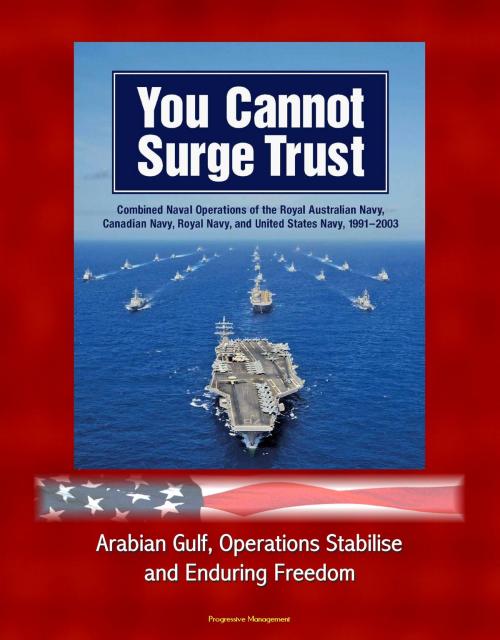You Cannot Surge Trust: Combined Naval Operations of the Royal Australian Navy, Canadian Navy, Royal Navy, and United States Navy, 1991-2003 - Arabian Gulf, Operations Stabilise and Enduring Freedom
Nonfiction, History, Military, Naval| Author: | Progressive Management | ISBN: | 9781310590627 |
| Publisher: | Progressive Management | Publication: | April 8, 2015 |
| Imprint: | Smashwords Edition | Language: | English |
| Author: | Progressive Management |
| ISBN: | 9781310590627 |
| Publisher: | Progressive Management |
| Publication: | April 8, 2015 |
| Imprint: | Smashwords Edition |
| Language: | English |
Professionally converted for accurate flowing-text e-book format reproduction, this important work by the Navy focuses on combined naval operations of the Royal Australian Navy, Canadian Navy, Royal Navy, and United States Navy from 1991-2003. After the Cold War, maritime forces shifted much of their focus from engagements at sea to events ashore. Naval forces were uniquely positioned to influence regional conflicts and to conduct peace support operations called for by the international community—particularly when they cooperated with one another. In this book, naval historians from Australia, Canada, the United Kingdom, and the United States explore how their navies created an effective multinational, or "combined," framework of interoperability while under national rules of engagement. The authors address cases including maritime operations during the First Gulf War (1990-1991) and later (2001-2003) as part of Operation Enduring Freedom; off the Federal Republic of Yugoslavia in Operation Sharp Guard (1991-1996); and in East Timor during Operation Stabilise (1999-2000). This multinational naval force's success in each crisis depended not just on shared doctrine, training, tactics, and technology, but on the trust its sailors built in combined operations over time.
As our nation and our Navy shift their focus away from the land wars in Iraq and Afghanistan that have so dominated our internal conversations for more than a decade and pivot toward the Asia-Pacific region, it is most appropriate that this study, You Cannot Surge Trust, should make its appearance. The assembled authors, under the assured editorial hand of Sandra Doyle, bring forward a series of episodes that demonstrate the evolving and increasingly important nature of maritime coalition operations around the world. Beginning with a look at maritime interception operations in the Arabian Gulf during Operations Desert Shield and Desert Storm, this work moves forward through the post-Cold War era to include recent operations in the Middle East and central Asia. Written from a multinational point of view, the analysis suggests that nations, even superpowers, are increasingly dependent upon each other for support during major combat operations and that only by frequent consultation, exercises, cooperation in technology development, and understanding of force structure capabilities will future maritime coalitions be successful.
This study also advances a larger argument regarding the relevance of naval and maritime history in defense policy development. The challenges faced by coalition forces during the 1991 to 2005 period are not so different from what confronted those who sailed before. The crews of Continental Navy ships during the American Revolution had difficulty keeping up with French ships owing to differences in the size of the respective fleets and individual ship design. During World Wars I and II the U.S. and Royal navies consistently had to overcome problems inherent in differences in classification and communications. Lastly, in the increasingly geopolitical complexities of modern warfare, illustrated by our experiences operating alongside allies in Korea and Vietnam, history reveals that the different rules of engagement under which nations exercise their forces can cause conflicts within a partnership—even as the partners prosecute a conflict. Each of these issues has been raised before, each is examined within You Cannot Surge Trust, and each will raise its head again in some future hostility. To the extent that decision makers review history and anticipate the future they can anticipate success. Ignorance of the past necessarily results in a painful fate of rediscovering lessons hard learned.
Professionally converted for accurate flowing-text e-book format reproduction, this important work by the Navy focuses on combined naval operations of the Royal Australian Navy, Canadian Navy, Royal Navy, and United States Navy from 1991-2003. After the Cold War, maritime forces shifted much of their focus from engagements at sea to events ashore. Naval forces were uniquely positioned to influence regional conflicts and to conduct peace support operations called for by the international community—particularly when they cooperated with one another. In this book, naval historians from Australia, Canada, the United Kingdom, and the United States explore how their navies created an effective multinational, or "combined," framework of interoperability while under national rules of engagement. The authors address cases including maritime operations during the First Gulf War (1990-1991) and later (2001-2003) as part of Operation Enduring Freedom; off the Federal Republic of Yugoslavia in Operation Sharp Guard (1991-1996); and in East Timor during Operation Stabilise (1999-2000). This multinational naval force's success in each crisis depended not just on shared doctrine, training, tactics, and technology, but on the trust its sailors built in combined operations over time.
As our nation and our Navy shift their focus away from the land wars in Iraq and Afghanistan that have so dominated our internal conversations for more than a decade and pivot toward the Asia-Pacific region, it is most appropriate that this study, You Cannot Surge Trust, should make its appearance. The assembled authors, under the assured editorial hand of Sandra Doyle, bring forward a series of episodes that demonstrate the evolving and increasingly important nature of maritime coalition operations around the world. Beginning with a look at maritime interception operations in the Arabian Gulf during Operations Desert Shield and Desert Storm, this work moves forward through the post-Cold War era to include recent operations in the Middle East and central Asia. Written from a multinational point of view, the analysis suggests that nations, even superpowers, are increasingly dependent upon each other for support during major combat operations and that only by frequent consultation, exercises, cooperation in technology development, and understanding of force structure capabilities will future maritime coalitions be successful.
This study also advances a larger argument regarding the relevance of naval and maritime history in defense policy development. The challenges faced by coalition forces during the 1991 to 2005 period are not so different from what confronted those who sailed before. The crews of Continental Navy ships during the American Revolution had difficulty keeping up with French ships owing to differences in the size of the respective fleets and individual ship design. During World Wars I and II the U.S. and Royal navies consistently had to overcome problems inherent in differences in classification and communications. Lastly, in the increasingly geopolitical complexities of modern warfare, illustrated by our experiences operating alongside allies in Korea and Vietnam, history reveals that the different rules of engagement under which nations exercise their forces can cause conflicts within a partnership—even as the partners prosecute a conflict. Each of these issues has been raised before, each is examined within You Cannot Surge Trust, and each will raise its head again in some future hostility. To the extent that decision makers review history and anticipate the future they can anticipate success. Ignorance of the past necessarily results in a painful fate of rediscovering lessons hard learned.















